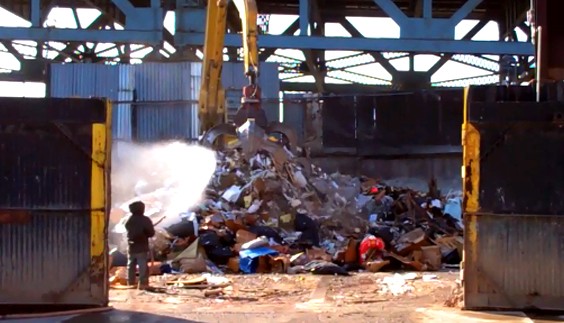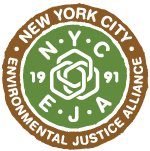
Waste Equity Overview
New York City creates roughly 44 million pounds of garbage every day. Several communities in New York City (most notably North Brooklyn, the South Bronx, Sunset Park and SE Queens) are ringed by heavy manufacturing zones along their waterfronts or have mixed-use zones within their borders. These areas have become saturated with privately owned and operated waste transfer stations that handle commercial waste from the city’s hotels, offices and restaurants. The transfer stations, where waste is shifted from collection vehicles to long-haul trucks, bring thousands of heavy diesel trucks through these communities each day, communities with some of the highest asthma rates in the country. Since the closing of the Fresh Kills landfill (which re-routed most of NYC’s residential waste to these same communities), over 75% of the City’s entire solid waste stream is now processed in just four community districts throughout the City. The vast majority of this garbage generated by businesses and buildings citywide passes through communities with some of the highest rates of asthma. Despite laws intended to change this, these communities of color continue to deal with far more than their fair share of heavy truck traffic, safety hazards, pollution, noise, and odor that other neighborhoods are spared.
NYC-EJA co-leads several efforts for comprehensive policy reforms to address this disproportionate burdening of solid waste:
Since October 2013, the Transform Don’t Trash NYC (TDT) coalition has worked together toward reformation of the solid waste industry, in a campaign that culminated in the October 2019 City Council passage of the Commercial Waste Zones Law (Local Law 199), the most ambitious overhaul of NYC’s commercial waste system in a generation. Through this system, the City will significantly reduce the truck pollution generated by the current commercial waste system, incentivize new investments in recycling infrastructure and cleaner trucks, set clear standards for worker safety and environmental impacts, and improve customer service for businesses. TDT-NYC – a partnership between environmental justice advocates and the International Brotherhood of Teamsters Joint Council 16, NY Lawyers for the Public Interest, ALIGN, NRDC, NYC-EJA and other allies – marks the first time that a broad-based labor, environmental justice, and community coalition has united around recommendations to improve commercial solid waste management in New York City. For more information, please read Clearing the Air: How Reforming the Commercial Waste Sector Can Address Air Quality Issues in Environmental Justice Communities and the 2019 report Fighting New York’s Climate Emergency With Waste Zones.
In 2025, TDT launched the People’s SWMP report to provide an analysis of the progress, or lack thereof, the Department of Sanitation (DSNY) has made in key areas identified within the 2006 SWMP and provides recommendations for key solutions in the upcoming 2026 SWMP based on input gathered from impacted community members, solid waste experts and research conducted on other solid waste plans across the United States. These recommendations were identified as central to creating a solid waste system that is truly equitable and enables New York City and State to continue moving towards its climate goals while creating a plan that addresses the concerns of everyday New Yorkers. These include the long-promised transition from polluting truck-based waste export to the use of marine and rail waste export, the implementation of Commercial Waste Zones, improved composting infrastructure and initiatives towards Zero-Waste.
About one-third of residential waste within the city is organic, and when commingled with general refuse, it passes through truck-based transfer stations in environmental justice communities in NYC before going to landfills and incinerators outside of the City. Food scraps and yard waste can be used to produce nutrient-rich compost, which, when applied to soils, has numerous social and environmental benefits. In 2020, the de Blasio administration proposed to remove all forms of public composting from the NYC budget. The Save Our Compost coalition, including environmental groups, microhaulers, community-based compost collectors, and other allied organizations, formed in response to this announced decision and successfully fought the administration’s intention to completely eliminate the food scrap drop-off program.
As of October 2024, DSNY has completed the rollout of the citywide curbside organics collection after the program began in 2022, starting with Queens and concluding with the Bronx implementation. The program accepts food scraps, food-soiled paper, and yard waste for weekly collection on the same day as recycling. However, while enforcement began in April 2025 for the mandatory separation of organics, fines for noncompliance have largely been suspended, resulting in a large drop in participation.
NYC-EJA continues to fight for full implementation of the SWMP, including the construction of marine and rail-based waste transfer stations to significantly reduce truck traffic, and begin delivering on the promise of waste equity among the boroughs.
In 2012, when the Bloomberg Administration issued an RFP for “waste-to-energy” incineration, NYC-EJA, our members and allies, launched an advocacy campaign to educate government officials, the media and general public, about the risks associated with these polluting technologies — which can also undermine waste reduction and recycling initiatives. The Bloomberg Administration ultimately abandoned the proposal.
Accomplishments
Due to the advocacy of NYC-EJA, the Save Our Compost Coalition, and hundreds of residents across the City, in 2020, the New York City Council approved a budget that partially restored the amount of $2.8 million for the food scrap drop-off program budget of New York City.
In October 2019, the Commercial Waste Zones Law (Local Law 199) was passed by the City Council, which includes many benefits for environmental justice communities and the City as a whole – read more in our newsletter announcement following the victory.
In August 2018, the Waste Equity Law was passed in City Council, a step in the right direction that prohibits the increase of waste burdens in communities that handle over 10% of the City’s waste, and reduces the amount of waste that private transfer stations can accept by up to 50 percent in North Brooklyn and 33 percent in the South Bronx and Southeast Queens.
Clean Carting Trucks Bill: At the invitation of the City Council, NYC-EJA provided advice for the Clean Carting Trucks Bill, Intro. 1160A: Over 8,000 heavy-duty diesel trucks – accounting for 20% of all particulate matter (PM) generated by heavy-duty trucks in NYC – collect millions of tons of commercial waste annually. Adopted by the City Council in December 2013, Intro 1160A seeks to ensure that by 2020, all licensed waste haulers use only trucks that meet the U.S. EPA´s 2007 emissions standards for diesel trucks, or are fitted with the best available retrofit technology. This clean truck transition is still underway.
Waste Transfer Station Sitings:Over the years, NYC-EJA’s efforts with NYLPI & OWN defeated the siting of several regional mega-waste transfer stations proposed for Red Hook, Williamsburg and the South Bronx, and inspired passage of several laws, including the implementation of Local Law 40 (siting regulations for waste transfer stations) and new operational regulations for transfer stations. As a result, our campaign altered an essential City service and the largest waste management system of any U.S. city.
Solid Waste Management Plan (SWMP): Long championed by NYC-EJA, the 20-year Solid Waste Management Plan (or SWMP) adopted by Mayor Bloomberg and the City Council in 2006 was an innovative plan that relied for the first time on principles of environmental justice and borough equity. At its heart, the SWMP is a sweeping overhaul of the City’s waste export system that substitutes a polluting truck-based system confined to a handful of overburdened communities to a water-based, less polluting barge system that relies on a network of equitably sited, City-owned marine and rail transfer stations.
- NY Times, Mayoral Candidates Wrestle Over Waste Removal
- NY Times, In Fight Against Trash Station, Upper East Side Cites Injustice
- NY Daily News Editorial, GARBAGE IN, GARBAGE OUT
- NY Times Editorial, A Fair Way to Handle Trash
- NY Post Editorial, Chris & Billy’s trash talk
- Barge NYC’s Garbage For more information read, “Noxious New York: The Racial Politics of Urban Health and Environmental Justice,” by Julie Sze (2006); “We Won’t Move: Community Planning in The Real Estate Capital of the World,” by Tom Angotti (2008); and “The Battle for Gotham: New York in the Shadow of Robert Moses and Jane Jacobs,” by Roberta Brandes Gratz (2010)
- Residents Rally Against Plan To Reopen Garbage Transfer Station In NYC
- NEW YORK (CBS 2) — The City Council is set to approve a $66 billion budget Wednesday, averting firehouse closings and teacher layoffs, but some of the funds are earmarked for re-opening a garbage transfer station in a residential Manhattan neighborhood, Jay Dow reports.
- Fox NY, Fight Over Garbage Transfer Stations
- From the Editor: Say No to an Incinerator
- NY Capitol News, Trash and Burn
- NY Times, Gathering on Upper East Side to Oppose Garbage Station
- Brooklyn Eagle, Gonzalez Heralds Victory on Waste Management Fight
- Gotham Gazette, Bloomberg’s Environmental Plan Offers Lots of Parts, Little Controversy
- NY Post, City’s Talking Trash to Generate Energy
